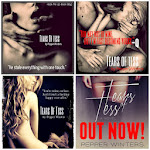NEW ORLEANS SEP 4, 2009
The Assassin’s voice boomed through the closed double doors to the study for the fifth time since he’d entered the room with Morgan’s Blood Sons, almost five hours before. Marcus cringed as the doors were flung open, and Nicholas strode out, rage radiating from every inch of his six–foot, four–inch frame. Storm–gray eyes landed on Marcus, narrowed to slits, and he stalked past, commanding him to follow with an imperious wave of his right hand. Not wanting to piss the Assassin off more, Marcus bit back a snide comment, and followed him up the sweeping staircase to the mansion’s upper floors.
“Damn it all to hell, Old Man!” Nicholas roared as he began pacing the landing at the top of the stairs. He wanted Marcus to throw himself against his temper to take the edge off.
Ye Gods, Marcus thought, we’ve done this more times than I’d care to count in the centuries we’ve known one another, but this is different. Well, something other than the fact that we’ve barely spoken a civil word to one another in almost two hundred years.
“I take it the boys couldn’t add anything to what we already knew. In spite of the almost five hour interrogation?” Marcus asked, fighting to rein in his own temper, leaning against the banister at the top of the stairs.
“Five hours?” Nicholas stopped moving. He turned to Marcus, meeting his eyes. The other vampire nodded. “It was really that long?”
“Yes. What’s next, Assassin?” Marcus asked, letting some of the frustration he felt give his voice a hard edge. The last thing they needed right now was for Nicholas to go soft.
“We can’t do anything before the sun sets,” he said, after giving Marcus a long, appraising look.
He’s assessed my well–being and decided I’m not fit for the field. I’ve seen that look too many times before and know better than to argue with him, Marcus thought, trying to work out a logical counter argument.
“I haven’t slept.” Nicholas sighed. “You look like death warmed over and those two are rattled.” He nodded toward the room where he’d left the younger vampires.
“Fine.” Marcus nodded. “I took the liberty of having my staff get us some SUVs. If Morgan’s alive, she’s going to need fresh blood. We’re going to need the extra room.” Marcus was almost certain that he didn’t have to mention that, but the desperate look in Nicholas’s eyes led him to believe that there was no such thing as being too careful in this situation.
“She has to be alive, Marcus.”
“We’ll find her.” Marcus answered, feeling like an ass for lying. We both know that the odds suck. This could be nothing more than trying to find her body. Gods, whoever did this is going to pay.
“I have a very bad feeling about this,” the Assassin muttered, looking through Marcus. Nicholas’s mind was turning over what he knew, making connections and searching for others.
“How so?” Marcus asked, prompting Nicholas to think aloud, knowing it helped him make connections he otherwise missed, and it gave Marcus the opportunity to make a few as well.
“The security footage Danny sent over from the club’s parking lot shows Morgan and her attackers, but never their faces.”
“The club has cameras outside?”
“Apparently one of the human staff had some trouble right after the club opened. Morgan had them installed after that.”
“They could have scoped out the cameras. Not too difficult when you know what to look for,” Marcus muttered, his brows drawn together. “Why didn’t anyone see her being attacked, if it was caught on camera? Why are we just learning about this now? Just because she somehow jacked my mind and knocked me flat on my ever–loving ass.” Marcus’s words sped up as he continued, agitation given voice.
“The footage is stored on massive hard drives but not reviewed unless an incident is reported. Since no one reported her disappearance…” Nicholas’s voice trailed off.
“I have a feeling Morgan will be revising that policy when she returns.”
“If she returns.”
Buy Now @ Amazon
Genre - Paranormal Urban Fantasy
Rating – PG-13
More details about the author and the book
Connect with Michelle Rabe on Facebook & Twitter
Website http://paperbackvamp.tumblr.com/





















